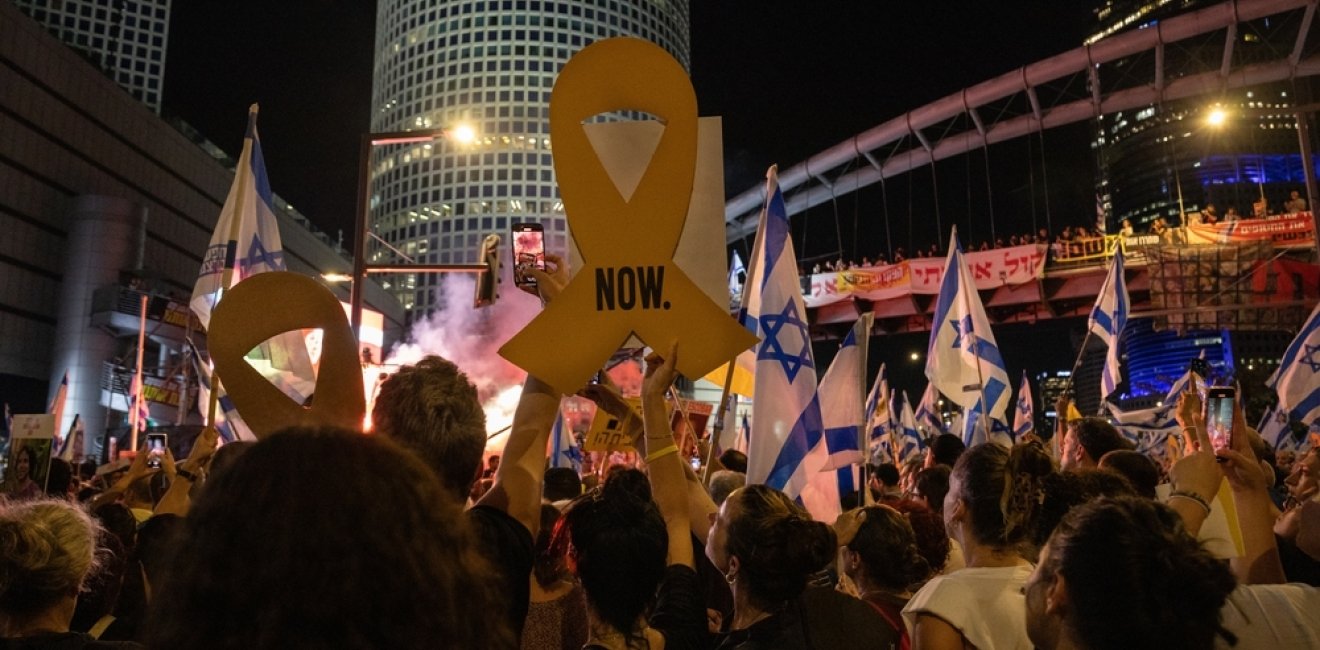But our focus is now on those suffering directly from this terrible violence. Until today, we are there every day with the families.
The Festival of Sukkot (Tabernacles) is a traditional harvest festival that falls at the end of summer. On this holiday, we appreciate the bounties of and our vulnerability to the forces of nature. It is a time to humbly contemplate our place in this world while celebrating life with family and friends.
It is also the time that Women Wage Peace has held its big rallies and marches: the “March of Hope” in 2016, the “Journey to Peace” in 2017, and a large gathering on October 4, 2023. When we, thousands of Israeli and Palestinian women supported by diplomats and other overseas visitors, gathered in Jerusalem and at the Dead Sea, our vulnerability was the last thing on our minds. We felt love, support, combined strength, determination, and hope. We were optimistic. All of that was shattered just three days later—on October 7.
The events of October 7
The day after the Festival of Sukkot is Simchat Torah, a day of rejoicing. For the religious community, of which I am part, much of the day is spent in the synagogue. My sister, who had come to Israel from Australia for the event on October 4, and I were on our way there when we heard the first sirens in Jerusalem.
We were totally unprepared and shocked by the number of times during the morning we were forced to run to shelters. Rumors started leaking into the synagogue of a terrible massacre in the south of the country—20...80 people killed. One of our prayer leaders suddenly left with his son when they received messages to report for reserve duty. Prayers were brought to a close. We decided to return home, even though we do not have a shelter where we live. Throughout the day, more and more kippah-wearing men were seen driving in uniform on streets that are usually devoid of cars because of the festival. After sunset, when we turned on the radio, we heard the reality of the situation. We were in shock.
I opened WhatsApp, and all my Women Wage Peace groups reported the same terrible news: our dear friend and mentor, Vivian Silver, had been taken captive by Hamas along with more than 200 others. Within days, we were in the streets along with thousands of families and friends of hostages, demanding their release. The turquoise flags of the movement were visible amidst the red of Women Against Violence and the increasingly prevalent yellow ribbons.
Our priorities now
Weeks later, we mourned the death of Vivian. She had been murdered on that terrible day, although it took weeks to identify her remains. However, our commitment to the families of the hostages did not waver for one minute. Other members of the movement were bereaved or still had relatives in captivity. We are all mothers, sisters, and daughters. We stand with each other. Our lives and priorities transitioned. We had been demonstrating for a diplomatic solution and that has not changed. We had been insisting that only peace will bring security. That has not changed. But our focus is now on those suffering directly from this terrible violence. Until today, we are there every day with the families.
Throughout all of this, we have strengthened our contact with our sisters in Women of the Sun, a Palestinian peace organization based in Bethlehem. Our mutual understanding of our shared destiny has never been clearer. Despite the odds, we have managed to implement shared initiatives and draw more women into the circle of peace activists. The small part I play in the Building Bridges program, bringing together women from four religions to share how our faith can contribute to peacebuilding, gives me meaning and purpose.
I said that on October 7, all our optimism was shattered. But not all of it did. We maintained our love and support and have gradually recovered our determination and even some hope.
Peta Jones Pellach is a member of Women Wage Peace, an Israeli grassroots peace movement formed in 2014.
The views represented in this piece are those of the author and do not express the official position of the Wilson Center.







